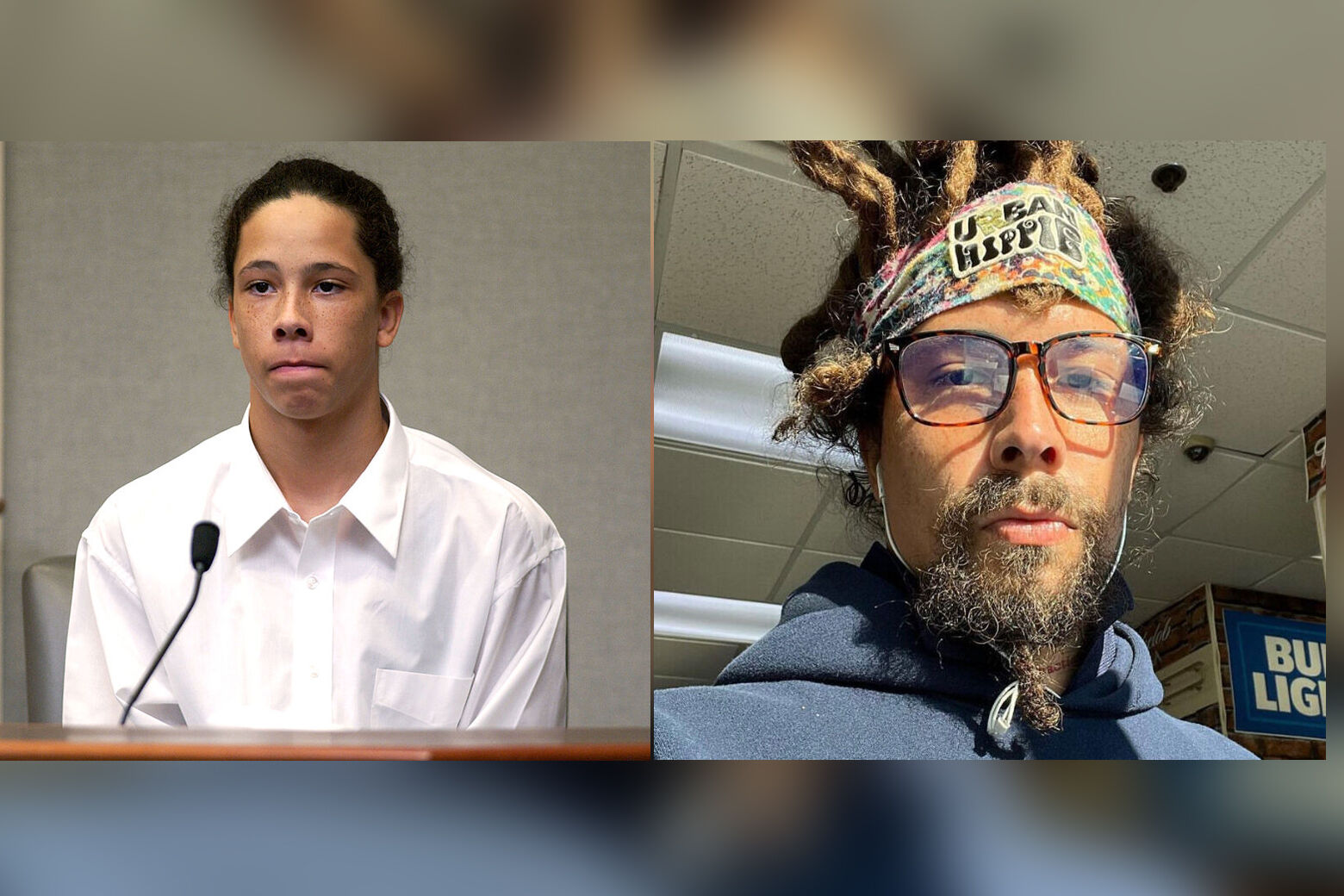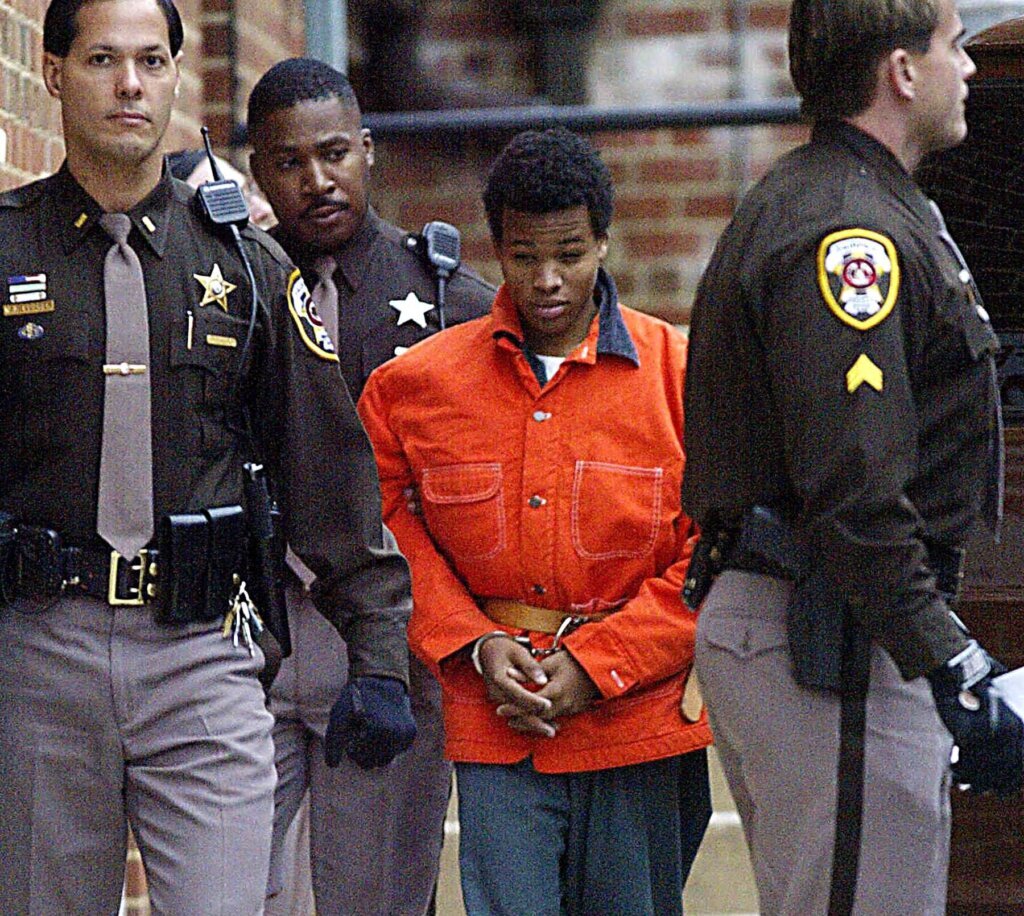For a 13-year-old boy, someone 17 seems much older.
Twenty years later, Iran Brown and Lee Boyd Malvo are both men in their middle 30s: “Our lives are forever intertwined,” Brown told WTOP. “He’s the guy who tried to kill me.”
- More Local News
- PHOTOS: Beltway Snipers artifacts — An inside look
- More coverage of the Muhammad case
- More coverage of the Malvo case
Brown, now 33, was shot by Malvo on the morning of Oct. 7, 2002, in the parking lot of Benjamin Tasker Middle School in Bowie, Maryland. His aunt rushed Brown to the emergency room — he was hospitalized for several weeks, with severe injuries to his internal organs.
On the 20th anniversary of being shot, Brown showed grace in contemplating the similarities between the convicted killer and the lucky survivor.
“It’s definitely a blessing to still be here,” said Brown.
John Allen Muhammad and Malvo killed 10 people in Maryland, Virginia and D.C. in October 2002. Brown and two others survived their injuries.
“I’m sure we’ve both grown a lot,” Brown said. “I will only assume that he’s become much sharper and much more remorseful after all this time being confined and having access to going over the case to educate himself.”
Brown, who originally grew up in Georgia, and now resides there, said he’s confident Malvo knew the seriousness of the crimes he and Muhammad were committing.
“Even though he was manipulated, he was obviously old enough to know better and to know what he was doing was wrong,” said Brown.

Brown testified against Muhammad during his October 2003 trial in Virginia Beach, Virginia. Muhammad was convicted and sentenced to death — he was executed in 2009.
At the time of Malvo’s first trial in the Fairfax County death of FBI analyst Linda Franklin, he was eligible for the death penalty. However, the jury in Chesapeake, Virginia that convicted him sentenced Malvo to life in prison.

Since then, a series of U.S. Supreme Court rulings that outlawed capital punishment for juveniles, and imposed strict conditions for a juvenile to be sentenced to life in prison, as well as a change in Virginia law, gave Malvo the opportunity to seek parole after serving nearly 20 years in prison. Last month, Malvo was denied parole.
“I feel pretty much the same now as I did back then,” Brown said. “Me, personally, I don’t want to be the judge, jury and executioner.”
Anticipating a question of whether he believed Malvo deserved the death penalty in 2003, Brown said he believes in second chances.
“I do agree with him definitely being in jail forever, but as far as if his life should be taken or not, I have no comment on that,” Brown said.
‘I look forward to sitting down with Malvo’
Over the years, Malvo has expressed remorse in various settings, including letters to victims’ families and during his trial in Montgomery County, Maryland, where he pleaded guilty to six murders and was sentenced to six life sentences.
Asked if he has ever been contacted over the years by Malvo or his attorneys, Brown said no.
“I actually have been looking forward to meeting him,” Brown said. “I haven’t had the opportunity yet — I had the impression he didn’t want to meet me.”
Asked why he would want to sit face to face with the person who tried who kill him, Brown didn’t flinch: “I’d just ask him questions, and get his perspective on what he went through, and why he did what they did.”
“There’s always two sides to a story,” said Brown. “So, I would definitely love to hear his perspective, and what was going on in his mind.”
Brown said he realizes Malvo may not share the same willingness.
“He has the right to tell me to f**k off,” Brown laughed ruefully. “He could tell me, ‘I don’t owe you anything.”
There are other reasons he and Malvo may never have a heart-to-heart: “I would assume it wouldn’t be in his best interests, with him trying to get parole, and my position of being for him remaining in jail, rather than being released.”
Do physical and mental scars fade?
Now an adult with a child, Brown was asked whether the sniper shooting ever retreats to the back of his mind.
“I’ve got a pretty cool scar that goes up my stomach, and across my chest,” Brown said. “It’s definitely a reminder of how thankful and blessed I am to still be here.”
Brown said he still has nerve damage from the shooting, and deals with post-traumatic stress disorder and anxiety periodically.
“I’d like to think I’ve handled it pretty well, though I understand I’ll never be 100%, so it’s just dealing with that on a daily basis,” said Brown, who is in the early stages of writing an autobiography.
“Whether I like it or not, I’m a part of history,” said Brown. “I’m still alive, so I can’t be doing very much complaining.”








